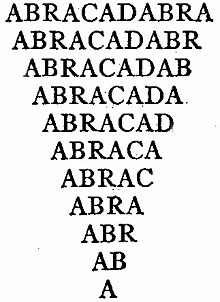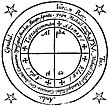
| Part of a series on |
| Magic |
|---|
 |
| Part of a series on |
| Thelema |
|---|
 |
| The Rights of Man |
In ceremonial magic, a magical formula or a word of power is a word that is believed to have specific supernatural effects. [1] They are words whose meaning illustrates principles and degrees of understanding that are often difficult to relay using other forms of speech or writing. It is a concise means to communicate very abstract information through the medium of a word or phrase.
Contents
These words often have no intrinsic meaning in and of themselves. However, when deconstructed, each individual letter may refer to some universal concept found in the system in which the formula appears. Additionally, in grouping certain letters together one is able to display meaningful sequences that are considered to be of value to the spiritual system that utilizes them (e.g., spiritual hierarchies, historiographic data, or psychological stages).
A formula's potency is understood and made usable by the magician only through prolonged meditation on its levels of meaning. Once these have been internalized by the magician, that person can then utilize the formula to maximum effect.[ citation needed ]
Since most of these permutative arrangements have their origin in Hermetic Qabalah, many of the formulae listed below can be best understood by using various techniques of Hebrew Kabbalah such as gematria (or isopsephy ), temurah , and notariqon to analyze them.[ citation needed ]